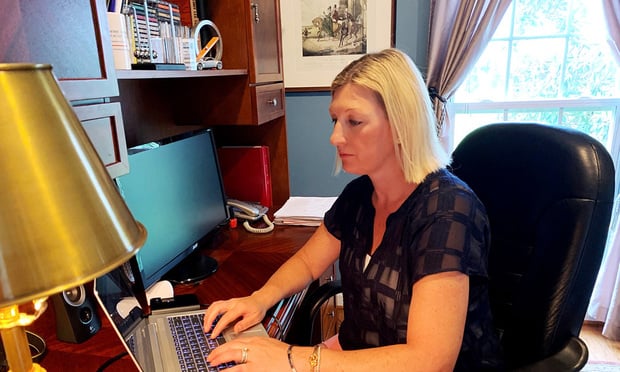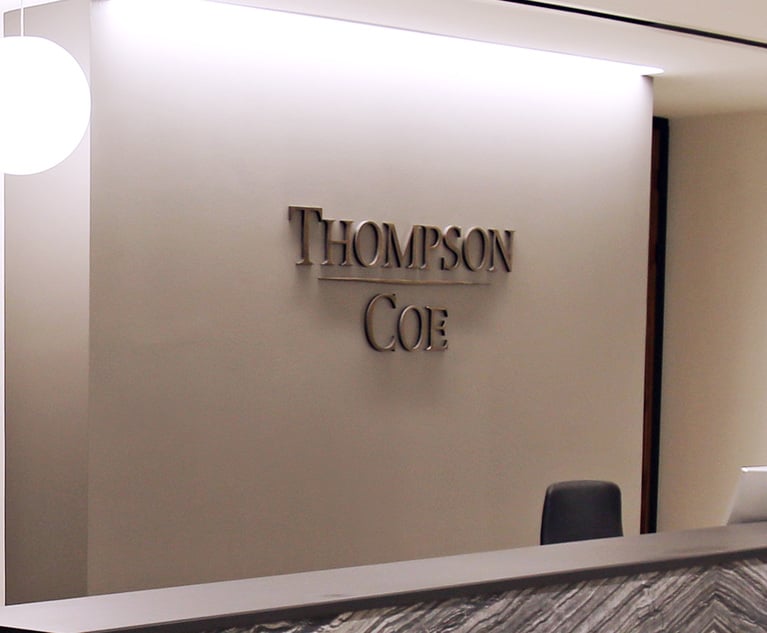For Many Firms, Client Relations Pros Have Been the Missing Link Through the Crisis
The pandemic has separated clients and lawyers. Client relations professionals are bringing them back together.
June 29, 2020 at 05:00 AM
7 minute read
 Melissa Prince, Ballard Spahr's chief client value and innovation officer, working from home during the COVID-19 pandemic, in Lumberton, New Jersey.
Melissa Prince, Ballard Spahr's chief client value and innovation officer, working from home during the COVID-19 pandemic, in Lumberton, New Jersey.
Editor's note: This article is part of The New View, a special report from The American Lawyer on how the coronavirus crisis is changing the way work gets done across the legal industry—now and in the future.
Melissa Prince has been watching change take place, gradually, for the past few years. As the chief client value and innovation officer at Ballard Spahr, she has seen more partners seek out her team's assistance. She has seen more clients seek the type of technology from her firm that can help solve their problems. And she has seen a growth in creative alternatives to the billable hour.
The coronavirus crisis, she says, is going to expedite it all.
"Change has been underfoot for a long time, and I think this is exacerbating that change," Prince says.
As lawyers in many parts of the country continue to work remotely, both they and their clients are turning more frequently to client value and client relations professionals like Prince to help bridge the gap that the pandemic has placed between them. And Prince and her counterparts across the industry are seizing the moment.
"This gives us an opportunity to shine," Julie Henson, chief client officer at Taft Stettinius & Hollister, says. "Sink or swim."
 Credit: Roberto Jiménez/Shutterstock.com
Credit: Roberto Jiménez/Shutterstock.comFor business professionals who handle pricing and budgeting issues, the crisis has posed a major test as clients struggle with cash flow concerns. Prince says several clients have shared a "blanket communication" indicating they're reducing the hourly rates of all their firms, most often by 20%.
"Our partners sometimes respond immediately and say, 'OK, we'll do it,'" Prince says. "And that's why you need the pricing team to be involved."
The requests can be hard to stomach, she says, but as a partner to the firm's clients, her team has to find solutions. In a growing number of cases, that has meant creative arrangements, like a fixed-fee plan for a client seeking rent relief for a number of properties, which included a success fee on the back end.
Ashton Batchelor, managing director of legal project management and client experience at Robins Kaplan, says her firm's pricing professionals are being introduced earlier in conversations with clients, a trend she expects to continue long after the pandemic subsides.
"To the extent that we weren't at the table before, it's created an impetus for us to be in those conversations," Batchelor says. "We've seen great outcomes."
Not everyone on either side of the table is comfortable with alternative fee arrangements, but client relations professionals say clients have become more interested in their options. Robins Kaplan has been aligning budgets with clients' fiscal calendars, taking on entire portfolios of litigation and other measures that can bring a level of predictability for clients, Batchelor says. She's also seen an increased appetite for shared-risk arrangements.
Henson says the coronavirus has made Taft "more empathetic" to clients that may have trouble paying in full or on time. With so many industries and business sectors in turmoil, she says it's never been more important to have one-on-one conversations with clients "to figure out how we are going to do this differently, how we can be helpful for them, and also to make sure that in this new normal we're setting the course and connecting with clients in a way that matters."
Dawn Sheiker, director of client relations at midsize Delaware firm Morris James, has also noticed increased demand for her services, which focus heavily on sales and business development. She says the crisis has given business professionals an opportunity to demonstrate their value, and she's responded by helping partners prepare for clients' new challenges, whether they involve a change in litigation strategy or issues around billing and budgeting. Like her counterparts, she expects the crisis to drive more lawyers and clients to bring business professionals into their relationships.
"For the role that I'm in, I've found it to be positive," Sheiker says. "Lawyers are busy at home working, trying to handle everything. They're more willing to engage me to help them—and the clients have always been there."
More lawyers are beginning to see client value professionals as strategic partners who can have a meaningful role in helping address clients' challenges. Batchelor says even the lawyers at Robins Kaplan who have already integrated the legal project management team into their work are looking "to take that to the next level."
"We've seen more depth in our adoption, and we are supporting more of the firm than we have before," Batchelor says.
For Prince, whose team of about two dozen professionals absorbed the firm's client technology efforts last year, the increased demand has largely been focused around technology, as lawyers and clients alike embrace the realities the pandemic has wrought, including senior partners who once remained distant. For the client seeking rent abatements, her team designed custom technology to help it track its requests.
Batchelor says her team can offer clients the data analytics and scenario modeling that they need now more than ever as they look to increase the efficiency and effectiveness of every dollar they spend on outside counsel. Her team has been most involved on the analytics side—developing dashboards for clients to help them focus on key performance indicators, and connecting both lawyers and clients to the data they need. That work has taken off during the crisis, she says.
"What drives all of this is price predictability, client value and price transparency," Batchelor says. "I don't see that returning to the pre-COVID state. We will continue to see that become a core part of the conversation."
The long-term effects of the current crisis could have a significant influence on the outlook for client-focused business professionals, most notably in regard to the potential for diminished office space. If firms enter the post-pandemic landscape newly comfortable with remote work and, as a result, pull back on expensive leases, they could be in a better position to keep their two most important stakeholders satisfied: clients and talent.
"If overhead costs go down, you can pay people more, people are generally happier, and then you can meet those client demands," Prince says.
In the end, she thinks the growing prominence of her fellow business professionals could eventually result in law firms elevating more individuals without law degrees into key positions, including CEO.
As client relations professionals rise up within their firms, Henson says they should be helping lawyers realize that doing great work is simply "table stakes" in an environment full of high-quality competition. Lawyers should be thinking about how to become a trusted adviser for clients and then taking the next step to become a business partner—and Henson and her counterparts across the industry should help them to do it.
"The more we can understand what clients want, that's going to lead us down the path of the nonlawyer professionals being ingrained in that relationship," Henson says. "For years it's slowly been ticking up, and this is expediting it."
Email: [email protected]
This content has been archived. It is available through our partners, LexisNexis® and Bloomberg Law.
To view this content, please continue to their sites.
Not a Lexis Subscriber?
Subscribe Now
Not a Bloomberg Law Subscriber?
Subscribe Now
NOT FOR REPRINT
© 2025 ALM Global, LLC, All Rights Reserved. Request academic re-use from www.copyright.com. All other uses, submit a request to [email protected]. For more information visit Asset & Logo Licensing.
You Might Like
View All
KPMG Wants to Provide Legal Services in the US. Now All Eyes Are on Their Big Four Peers



K&L Gates Sheds Space, but Will Stay in Flagship Pittsburgh Office After Lease Renewal
Law Firms Mentioned
Trending Stories
- 1'It's Not Going to Be Pretty': PayPal, Capital One Face Novel Class Actions Over 'Poaching' Commissions Owed Influencers
- 211th Circuit Rejects Trump's Emergency Request as DOJ Prepares to Release Special Counsel's Final Report
- 3Supreme Court Takes Up Challenge to ACA Task Force
- 4'Tragedy of Unspeakable Proportions:' Could Edison, DWP, Face Lawsuits Over LA Wildfires?
- 5Meta Pulls Plug on DEI Programs
Who Got The Work
Michael G. Bongiorno, Andrew Scott Dulberg and Elizabeth E. Driscoll from Wilmer Cutler Pickering Hale and Dorr have stepped in to represent Symbotic Inc., an A.I.-enabled technology platform that focuses on increasing supply chain efficiency, and other defendants in a pending shareholder derivative lawsuit. The case, filed Oct. 2 in Massachusetts District Court by the Brown Law Firm on behalf of Stephen Austen, accuses certain officers and directors of misleading investors in regard to Symbotic's potential for margin growth by failing to disclose that the company was not equipped to timely deploy its systems or manage expenses through project delays. The case, assigned to U.S. District Judge Nathaniel M. Gorton, is 1:24-cv-12522, Austen v. Cohen et al.
Who Got The Work
Edmund Polubinski and Marie Killmond of Davis Polk & Wardwell have entered appearances for data platform software development company MongoDB and other defendants in a pending shareholder derivative lawsuit. The action, filed Oct. 7 in New York Southern District Court by the Brown Law Firm, accuses the company's directors and/or officers of falsely expressing confidence in the company’s restructuring of its sales incentive plan and downplaying the severity of decreases in its upfront commitments. The case is 1:24-cv-07594, Roy v. Ittycheria et al.
Who Got The Work
Amy O. Bruchs and Kurt F. Ellison of Michael Best & Friedrich have entered appearances for Epic Systems Corp. in a pending employment discrimination lawsuit. The suit was filed Sept. 7 in Wisconsin Western District Court by Levine Eisberner LLC and Siri & Glimstad on behalf of a project manager who claims that he was wrongfully terminated after applying for a religious exemption to the defendant's COVID-19 vaccine mandate. The case, assigned to U.S. Magistrate Judge Anita Marie Boor, is 3:24-cv-00630, Secker, Nathan v. Epic Systems Corporation.
Who Got The Work
David X. Sullivan, Thomas J. Finn and Gregory A. Hall from McCarter & English have entered appearances for Sunrun Installation Services in a pending civil rights lawsuit. The complaint was filed Sept. 4 in Connecticut District Court by attorney Robert M. Berke on behalf of former employee George Edward Steins, who was arrested and charged with employing an unregistered home improvement salesperson. The complaint alleges that had Sunrun informed the Connecticut Department of Consumer Protection that the plaintiff's employment had ended in 2017 and that he no longer held Sunrun's home improvement contractor license, he would not have been hit with charges, which were dismissed in May 2024. The case, assigned to U.S. District Judge Jeffrey A. Meyer, is 3:24-cv-01423, Steins v. Sunrun, Inc. et al.
Who Got The Work
Greenberg Traurig shareholder Joshua L. Raskin has entered an appearance for boohoo.com UK Ltd. in a pending patent infringement lawsuit. The suit, filed Sept. 3 in Texas Eastern District Court by Rozier Hardt McDonough on behalf of Alto Dynamics, asserts five patents related to an online shopping platform. The case, assigned to U.S. District Judge Rodney Gilstrap, is 2:24-cv-00719, Alto Dynamics, LLC v. boohoo.com UK Limited.
Featured Firms
Law Offices of Gary Martin Hays & Associates, P.C.
(470) 294-1674
Law Offices of Mark E. Salomone
(857) 444-6468
Smith & Hassler
(713) 739-1250










